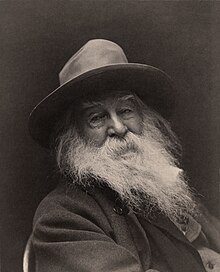American poet Walt Whitman was born 200 years ago on May 31, 1819. Celebrations around the country will take place to honor Whitman’s bicentennial. Read more about this celebrated figure in American history below.
|
Walt Whitman
|
|
|---|---|

Walt Whitman, 1887
|
|
| Born | Walter Whitman May 31, 1819 West Hills, New York, U.S. |
| Died | March 26, 1892 (aged 72) Camden, New Jersey, U.S. |
|
|
|
| Signature | |
Walter Whitman was an American poet, essayist, and journalist. A humanist, he was a part of the transition between transcendentalism and realism, incorporating both views in his works. Whitman is among the most influential poets in the American canon, often called the father of free verse.[1] A British friend of Walt Whitman, Mary Smith Whitall Costelloe, argued: “You cannot really understand America without Walt Whitman, without Leaves of Grass … He has expressed that civilization, ‘up to date,’ as he would say, and no student of the philosophy of history can do without him.”[2]Modernist poet Ezra Pound called Whitman “America’s poet … He is America.”[3]His work was very controversial in its time, particularly his poetry collection Leaves of Grass, which was described as obscene for its overt emphasis on the glory of being human and its sexuality.
Walt Whitman has been claimed as the first “poet of democracy” in the United States, a title meant to reflect his ability to write in a singularly American character. Andrew Carnegie called him “the great poet of America so far”.[163] Whitman considered himself a messiah-like figure in poetry.[164] Others agreed: one of his admirers, William Sloane Kennedy, speculated that “people will be celebrating the birth of Walt Whitman as they are now the birth of Christ”.[165]
The literary critic, Harold Bloom wrote, as the introduction for the 150th anniversary of Leaves of Grass:
If you are American, then Walt Whitman is your imaginative father and mother, even if, like myself, you have never composed a line of verse. You can nominate a fair number of literary works as candidates for the secular Scripture of the United States. They might include Melville’s Moby-Dick, Twain’s Adventures of Huckleberry Finn, and Emerson’s two series of Essays and The Conduct of Life. None of those, not even Emerson’s, are as central as the first edition of Leaves of Grass.[166]
I Hear America Singing
By Walt Whitman